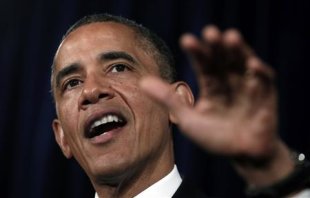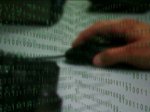 President Barack Obama speaks about the National Security Agency's secret collection of telephone records. (Kevin …
President Barack Obama speaks about the National Security Agency's secret collection of telephone records. (Kevin …President Barack Obama on Friday defiantly defended the government's newly revealed telephone and Internet spying programs on grounds that Americans must tolerate what he dismissed as "modest encroachments on privacy" in the name of security.
With evident impatience, Obama suggested at one point that he set limits on what the National Security Agency (NSA) can grab without a judge's OK because he himself might one day be the target of such snooping.
"I came in with a healthy skepticism about these programs," Obama said at an event in San Jose, Calif., initially designed to trumpet Obamacare but subverted by the dramatic disclosures. "My team evaluated them. We scrubbed them thoroughly. We actually expanded some of the oversight, increased some of the safeguards."
But, the president said, "My assessment, and my team’s assessment, was that they help us prevent terrorist attacks. And the modest encroachments on privacy that are involved in getting phone numbers, or duration [of calls] without a name attached, and without looking at content, that on net it was worth us doing."
His remarks came amid an uproar over a series of news media reports contending that the NSA has been scooping up—with the blessing of a secret court order—the telephone records of millions of Americans. Other news outlets have reported that the agency, arguably the world's largest electronic spying operation, has also been sucking up personal data from major Internet companies. (Yahoo, parent company of Yahoo News, is listed among those firms).
Obama underlined that "nobody is listening to your phone calls" in the broad NSA phone sweep, and that doing so would require a federal judge to sign off. As for the Internet surveillance, he said, it "does not apply to U.S. citizens and it does not apply to people living in the United States."
But "there are some trade-offs," Obama said. "You can’t have 100 percent security and also then have 100 percent privacy, and zero inconvenience. We’re going to have to make some choices as a society."
The surveillance programs have helped the government "anticipate and prevent possible terrorist activity," he said. "On balance, we have established a process and a procedure that the American people should feel comfortable about."
Obama said Congress had been fully briefed on the various secret programs, and suggested that lawmakers who disapproved of those initiatives or to "abuses" could have objected. But lawmakers critical of such programs have repeatedly made clear that they are hamstrung by the administration's decision to classify information—making a full, public debate involving the American public impossible.
The president dismissed the "hype" that portrays such programs as s stepping stone towards
a tyrannical "Big Brother"-like government. He also denounced the leaks that fed the news reports, saying the nation's secrets cannot be "dumped out willy-nilly" without damaging national security.
The Obama administration, while portraying government whistle-blowers and an independent media as pivotal to a healthy democracy, has prosecuted more leakers than all other administrations combined. And the past few weeks have brought disclosures of Justice Department surveillance of reporters and even one instance of a journalist accused in a government document of acting like a spy for doing his job.
"That’s not to suggest that you just say ‘trust me, we’re doing the right thing, we know who the bad guys are,'" Obama insisted.
"With respect to my concerns about privacy issues: I will leave this office at some point—sometime in the next three and a half years—and after that I'll be a private citizen," he said. "And I suspect that on a list of people who might be targeted so that somebody could read their emails or listen to their phone calls, I’d probably be pretty high on that list. So it's not as though I don't have a a personal interest in making sure my privacy is protected."

 President Barack Obama speaks about the National Security Agency's secret collection of telephone records. (Kevin …President Barack Obama on Friday defiantly defended the government's newly revealed telephone and Internet spying programs on grounds that Americans must tolerate what he dismissed as "modest encroachments on privacy" in the name of security.
President Barack Obama speaks about the National Security Agency's secret collection of telephone records. (Kevin …President Barack Obama on Friday defiantly defended the government's newly revealed telephone and Internet spying programs on grounds that Americans must tolerate what he dismissed as "modest encroachments on privacy" in the name of security.











































































No comments:
Post a Comment